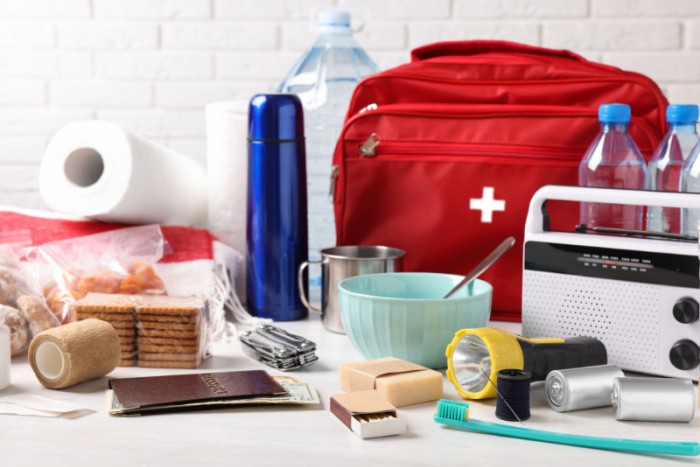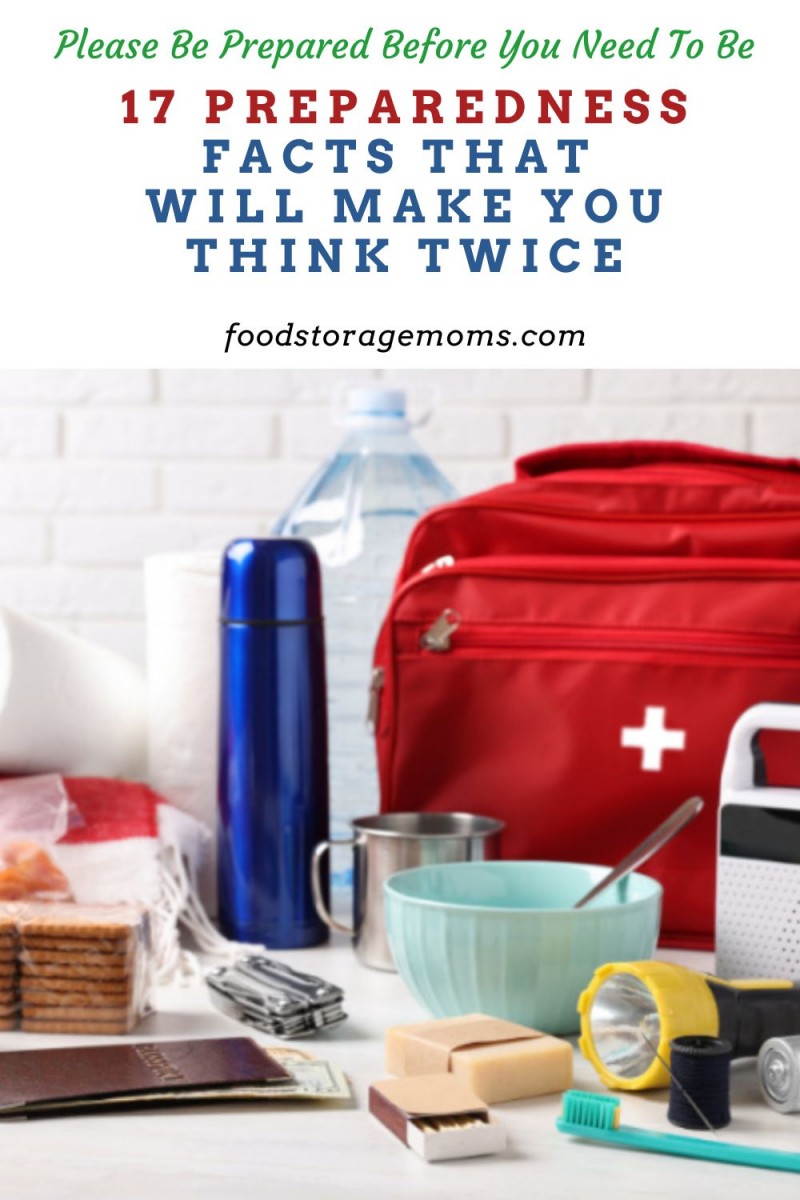
Are you one of those people who believe that preparedness is only for “other” people? If so, you might want to think again. The truth is, being prepared can save your life, and not just in the event of a natural disaster. In this blog post, we’re going to take a look at some of the preparedness facts that will make you think twice about being prepared.
Items I highly Recommend:
- Flashlights with Batteries
- Solar Flashlights
- Solar Lanterns
- Butane Stove with Fuel
- Dutch Oven
- NOAA Radio
What is Preparedness?
What is preparedness? The definition of preparedness is being ready or willing for something. What does that mean for each of us?
For some, being preparedness-minded is making sure there is an extra can of soup in the cupboard and an emergency candle in the drawer. And while those supplies are important, they only scratch the surface when it comes to true preparedness.
True preparedness starts with a mindset. A mindset of self-sufficiency and self-reliance. A person with a preparedness mindset understands that they are ultimately responsible for their own safety and well-being. They take steps to be proactive instead of reactive. They plan and prepare for events before they happen.
So, what does preparedness look like? It looks different for everyone because we all have different needs, resources, and abilities. But there are some common themes among people who are truly prepared.
People who are truly prepared have a food storage plan and are working towards self-sufficiency. They know how to grow and preserve food. They have water storage systems in place and know how to purify water, if necessary. They understand the importance of having medical supplies on hand and know how to use them. They are also financially prepared with an emergency fund and a plan for how to survive if they lose their income for a period.

Why Should You Be Prepared?
Now that we’ve answered the question, “What is preparedness?” It’s time to take a look at some of the reasons why being prepared is so important.
1. Emergencies Can Happen Anytime
No one is immune to emergencies. They can happen to anyone, anywhere, at any time. And while we hope that we’ll never have to face an emergency, the truth is that it’s always better to be prepared, just in case.
2. Emergencies Can Be Disastrous
While some emergencies may be minor, others can be disastrous. And even if an emergency isn’t life-threatening, it can still be disruptive and cause a lot of inconveniences.
3. Being Prepared Can Reduce the Impact
While we can’t always prevent emergencies from happening, being prepared can help reduce the impact of an emergency. If we have a plan and supplies in place ahead of time, we’ll be better able to cope with the situation and recover more quickly.
4. Being Prepared Can Help Save Lives
In some emergencies, being prepared can literally mean the difference between life and death. That’s why it’s so important to have a plan and supplies in place before an emergency happens.
5. Being Prepared Can Reduce the Financial Impact
Emergencies can be expensive. If we’re not prepared, we may have to spend money on things like food, water, and shelter just to stay alive, and do so when we might be the most volnerable financially. But if we’re prepared, we can reduce the financial impact of an emergency.
6. Being Prepared Helps Get You Back to Normal
After an emergency, we often want to get back to our normal routines as quickly as possible. But if we’re not prepared, that can be difficult. If we are prepared, however, we can more easily get back to our normal lives after an emergency.
7. Preparedness is Essential For Our Safety
In an emergency, our safety is paramount. And being prepared can help ensure our safety and the safety of our families.
8. Preparedness is an Investment In Our Future
When we’re prepared, we’re investing in our future. We’re making sure that we’re ready for anything that comes our way. And that’s an investment that’s always worth making.
17 Preparedness Facts That Will Make You Think Twice
Are you the kind of person who likes to be prepared for everything? Do you have a go-bag packed and ready to go should disaster strike? If so, then you’re in good company. Millions of people around the world are preppers and for good reason. Prepping can help you be better prepared for disasters, both big and small.
But even if you’re not a prepper, it’s always a good idea to know a little bit about the art of preparedness. So today, we’re going to take a look at 17 facts about preparedness that will make you think twice about being prepared.
1. 48% of Americans lack emergency supplies in the event of a disaster.
Trying to get emergency supplies after a disaster is not always feasible. Those who prepared PRIOR to major disasters had an easier time than those who did not.
2. More than half of parents don’t have a meeting place designated with their kids in times of emergency.
During a major disaster phone lines will most likely be down. This makes it hard to find loved ones. Being prepared with a meeting place gets everyone together quicker. Don’t forget to practice an evacuation plan and determine in advance various routes and locations to meet in case situations change.
3. 42% of people don’t know immediate family members’ phone numbers.
In a disaster, your phone could break or you won’t be able to use it. It’s important to have numbers written down. Having contact info on your phone or on your computer is great, but during an emergency, they may not work for a number of reasons. Don’t count on having a bunch of numbers memorized, have them written down somewhere that’s convenient.
4. More than half of all Americans don’t have copies of important documents.
You will need the title/deed to your house and cars, Social Security cards, passports, birth certificates, medical information, etc. This may seem like a daunting task, but I would also encourage you to have paper copies as well. Please store everything in a secure location. A Grab and Go Emergency Binder is awesome.
5. Almost 60% of Americans have less than $500 in savings.
A major disaster could happen at any time and it’s important to have money saved up for emergencies. More than 1 in 3 Americans have no savings at all.
6. 1 in 4 people have no evacuation plan.
In the event of a fire or another disaster, you need to know how to get out quickly and safely. Again, practice the plan from time to time.
7. Only 26% of Americans have taken steps to harden their homes against disasters.
This includes things like securing loose objects and stocking up on supplies.
8. 29% of people have no idea what to do if they experience a power outage.
This is one of the most common types of disasters. You should have a plan for how to stay safe and warm during a power outage.
9. 3 in 10 people don’t know how to turn off the water in their homes.
If a pipe bursts, it’s important to know how to turn off the water to your home quickly. We always turn off the water source to our home if we’re going out of town. We also turn off the valves to our clothes washer.
10. 1 in 4 people have no first-aid kit.
A first-aid kit is essential for any household. You never know when someone will need it. Having the supplies is great, but you also need to know how to use them. Sign up for a first aid class NOW if you haven’t had one in a while.
11. Only 14% of people have taken steps to protect their homes from flooding.
This is one of the most common types of disasters. You can take some simple steps to protect your home from flooding. This includes water from the outside and inside.
12. 1 in 3 people don’t know how to use a fire extinguisher.
If a fire does start in your home, you need to know how to put it out quickly and safely. Mark and I took a CERT (Community Emergency Response Team) class, and the use of extinguishers was an important session.
13. Only 12% of people have taken steps to prepare their pets for a disaster.
This includes things like having a pet-friendly place to stay and having enough food and water for your pet.
14. 1 in 5 people have no emergency supplies in their homes.
This includes things like food, water, and first-aid kits. These are just a few of the items you should have on hand in case of an emergency.
15. Most people don’t know how to purify water.
If you don’t have clean water, you can get sick. You should know how to purify water so you can have safe drinking water in an emergency.
16. In the US only 25% of households garden.
A garden is a great way to have fresh fruits and vegetables, even in an emergency.
17. 70% of people say they would help a neighbor in need, but only 42% actually do.
In a disaster, your neighbors can be a great resource. But you should also be prepared to take care of yourself and your family first.
Check Out My Other Articles on Preparedness:
- 29 Preparedness Items To Buy If You Are Not Prepared
- Family Documents: What You Need
- 10 Fascinating Clarifications on Preparedness
- 15 Ways to Become More Self Sufficient
Final Word
As you can see, there are a lot of things to consider when it comes to preparedness. But being prepared is essential to keeping yourself and your family safe during a disaster. Take the time to learn about the different aspects of preparedness and make sure you are as prepared as you can be. May God Bless this world, Linda
Copyright Images: Disaster Supply Kit AdobeStock_497769293 by New Africa
